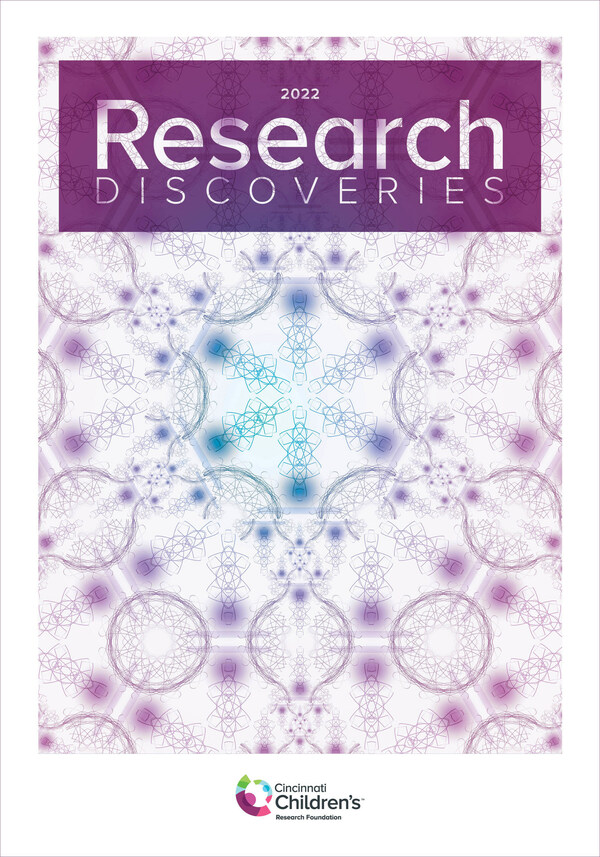More than $283M in grants and gifts fuel research accomplishments including new ways to make organoids, detecting infant-protecting super antibodies, predicting adult heart disease risk during childhood, and more.
CINCINNATI, Feb. 8, 2023 /PRNewswire/ — Even as research teams raced to study new vaccines and understand the potential impact of long-term COVID-19 symptoms, experts at Cincinnati Children’s Hospital Medical Center made important discoveries during fiscal 2022 on a wide range of child health conditions including mental health, cancer, and many other diseases.
The latest Research Annual Report from Cincinnati Children’s reflects the breadth and depth of scientific exploration occurring at one of the world’s top pediatric academic medical centers, where thousands of faculty, staff, and students collaborate with families and community partners to improve child health.
The six most significant discoveries featured this year include producing the most complex stomach organoid to date, working with colleagues in Uganda to improve outcomes for children with rheumatic heart disease, revealing the untapped potential of antibodies produced during pregnancy, advancing our understanding of muscular dystrophy, uncovering a rapid immune reaction system that may transform allergy treatment for many, and demonstrating that adult cardiovascular risks can be detected—and potentially reduced—during childhood.
“These discoveries and all the advances featured here reflect the dedication of our exceptionally talented faculty, lab teams and research collaborators, who actively push discoveries forward to improve child health, each and every day,” says Tina Cheng, MD, MPH, director of the Cincinnati Children’s Research Foundation, chair of Pediatrics at the University of Cincinnati, and chief medical officer for Cincinnati Children’s Hospital Medical Center.
View the full report online. Learn more about these breakthrough discoveries:
‘Super’ Antibody Discovery Opens Doors for New Vaccines, Therapies
An eye-opening study, published in Nature, reveals how the early days of mother-to-newborn immunity actually work. The findings suggest that researchers may be able to mimic amped-up antibodies produced by expecting mothers to create new drugs and vaccines to prevent a wide range of infectious diseases.
Novel Approach Generates Most Complex Stomach, Esophagus Organoids to Date
Using a new, three-layered assembly approach, scientists at Cincinnati Children’s report success at developing a stomach organoid so sophisticated that it has distinct glands and nerve cells that can control smooth muscle contractions. The study, published in Cell Stem Cell, reflects the latest in a string of organoid medicine breakthroughs achieved at Cincinnati Children’s.
Five Childhood Risk Factors Predict Risk of Adult Cardiovascular Events
Cincinnati Children’s scientists played central roles in a massive international study that tracked more than 38,000 people across decades to measure how closely childhood signs of heart disease risk predicted actual adult heart conditions. They found five risk factors that count, and report that taking early steps to address those risks can pay off later in life. Findings were published in The New England Journal of Medicine.
Two-Hit Model of Muscular Dystrophy May Re-Direct Hunt for Cures
For most people, muscle injury healing is spurred along by muscle satellite cells that function to regenerate the tissue. But for people with muscular dystrophy, those satellite cells actually contribute to muscle wasting, according to findings published in Nature Communications.
In Uganda, Rheumatic Heart Disease Research Reaches its GOAL
While rare in the United States, more than 40.5 million people globally are living with rheumatic heart disease, and more than 306,000 people die each year from a condition that starts from seemingly minor strep throat infections. Now, results from the GOAL trial in Uganda, published in the New England Journal of Medicine, show that low-cost penicillin treatments can sharply reduce latent rheumatic heart disease progression.
Targeting RipIL-33 Pathway Could Transform Allergy Treatment
The unexpected discovery of a built-in rapid reaction system that triggers inflammatory responses when people are exposed to allergens from insects, mites and fungi, may solve a mystery that has puzzled immunologists for years. The result could be a new wave of improved treatments to stop allergic inflammatory reactions, according to findings published in Nature Immunology.
PDF of the Research Annual Report available upon e-mail request
SOURCE Cincinnati Children’s Hospital Medical Center
Originally published at https://www.prnewswire.com/news-releases/top-discoveries-from-a-record-breaking-year-for-cincinnati-childrens-301738165.html
Images courtesy of https://pixabay.com



